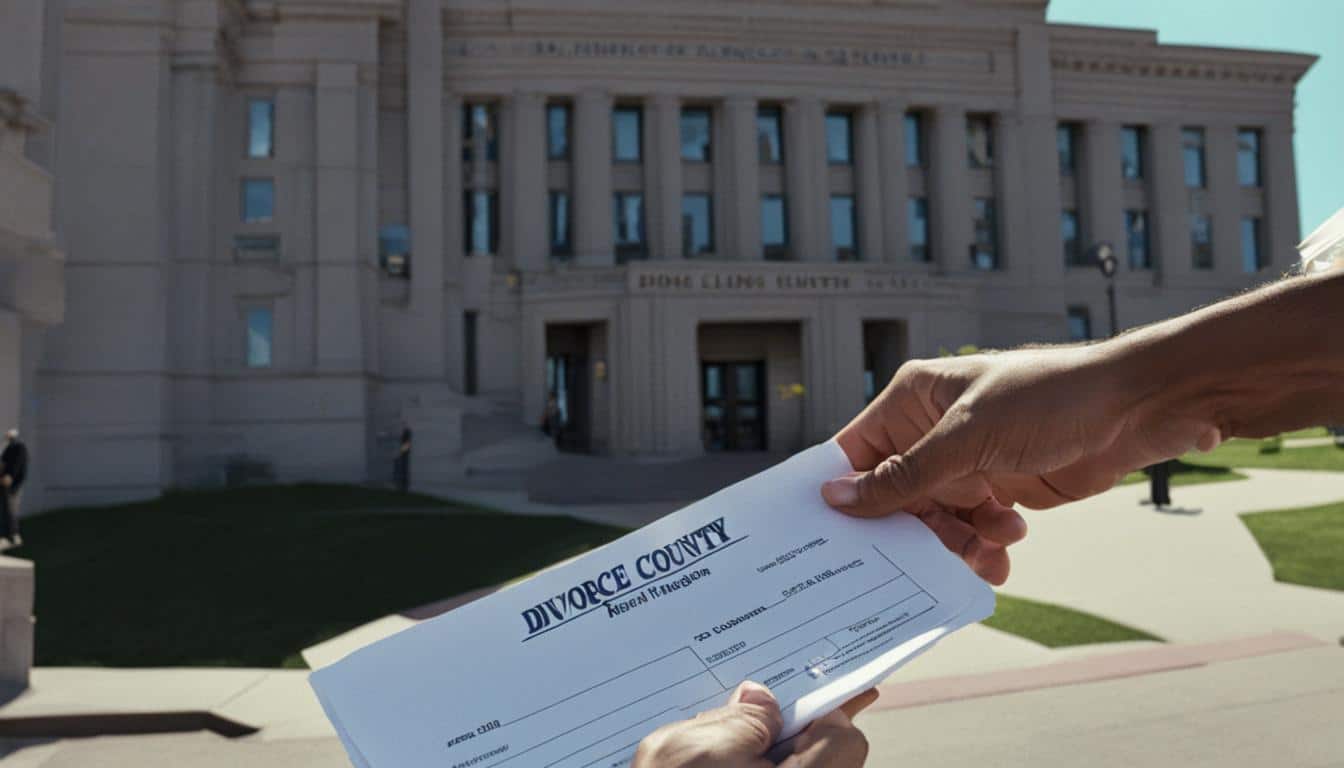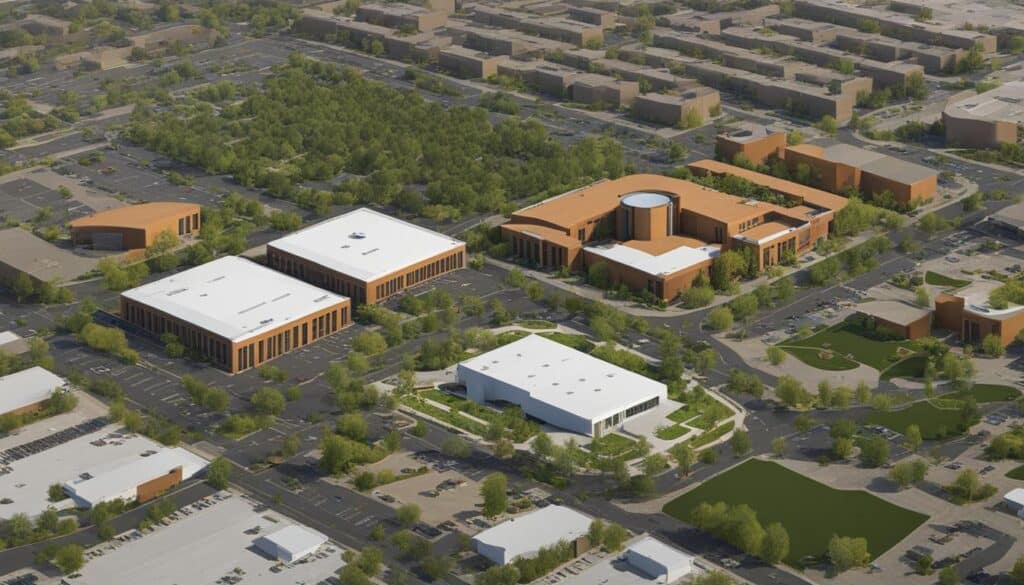Physical Address
304 North Cardinal St.
Dorchester Center, MA 02124
Physical Address
304 North Cardinal St.
Dorchester Center, MA 02124

Filing for divorce in Arapahoe County, CO, might feel like navigating a maze without a map. You’re not just dealing with the emotional turmoil; there’s also a pile of paperwork waiting for your attention. But here’s the thing: it doesn’t have to be as daunting as it seems.
This guide is your first step to understanding the process, making it a bit less overwhelming. From knowing where to start to getting the right documents in order, we’ve got you covered.

Let’s dive into the essentials of filing for divorce in Arapahoe County, breaking it down into manageable steps. Ready to take the first step towards a new chapter in your life? Keep reading to find out how to embark on this journey with confidence and clarity.
To get more info on filing for divorce in Colorado, find a detailed overview in our article, How to File for Divorce in Colorado.
Before filing for divorce in Arapahoe County, Colorado, it is important to determine if you meet the eligibility requirements. One of the main eligibility criteria is meeting the residency requirement. This section will outline the specific residency requirements for filing for divorce in Arapahoe County CO, including the minimum duration of residency and what constitutes a resident of the county.
To be eligible to file for divorce in Arapahoe County CO, you must meet certain residency requirements. These requirements ensure that the county has jurisdiction over your divorce case. The residency requirements for divorce in Arapahoe County CO are as follows:
It is important to note that simply owning property or having a mailing address in Arapahoe County is not sufficient to establish residency. You or your spouse must physically reside in the county for the specified duration.
Meeting the residency requirements is essential to ensure that your divorce case is filed in the appropriate jurisdiction. Failing to meet these requirements may result in your case being dismissed or transferred to another county.
| Residency Requirements for Divorce in Arapahoe County CO |
|---|
| You or your spouse must be a resident of Arapahoe County for at least 90 days before filing for divorce. |
| If you are in the military and stationed in Arapahoe County, you are considered a resident for divorce purposes regardless of the duration of your stay. |
Understanding the residency requirements for divorce in Arapahoe County CO is crucial to ensure a smooth and successful filing process. By meeting these requirements, you can proceed with confidence and take the necessary steps to initiate your divorce proceedings.
In Arapahoe County, Colorado, divorce is primarily based on the concept of no-fault divorce. This means that you do not need to prove fault or assign blame to file for divorce. The no-fault divorce system recognizes that marriages can end due to various reasons, and it focuses on the irretrievable breakdown of the relationship as grounds for divorce.
Unlike fault-based divorce, which requires providing evidence of specific wrongdoing, a no-fault divorce allows couples to dissolve their marriage amicably and without the need to prove fault. This approach aims to reduce conflict and provide a more efficient and straightforward process for divorcing couples.
Under the no-fault divorce system in Arapahoe County, Colorado, the only requirement is that one party believes that the marriage is irretrievably broken. This belief can be based on a range of reasons, such as incompatibility, growing apart, or differences in values or goals.
It is important to note that the no-fault divorce system does not negate the need to address important issues such as child custody, child support, division of assets, and spousal support. These matters can still be addressed during the divorce process, either through negotiations between the parties or, if necessary, with the assistance of a mediator or a court.
The no-fault divorce system in Arapahoe County CO provides a more streamlined and less adversarial approach to ending a marriage, allowing couples to focus on resolving their differences and moving forward with their lives.
Filing for divorce in Arapahoe County CO can seem overwhelming, but breaking it down into step-by-step instructions can make the process more manageable. Follow these steps to file for divorce:
Filing for divorce can be a complex process, which is why it’s important to consult with an experienced divorce attorney for guidance and to ensure that you fulfill all the necessary steps. However, if you choose to proceed without legal representation, following these steps can help you navigate the process effectively.
Filing for divorce in Arapahoe County CO incurs certain fees and costs. When considering the cost of divorce, it’s important to take into account the filing fees imposed by the Arapahoe County Courthouse. These fees cover the administrative expenses associated with processing the divorce case. In addition to the filing fees, there may be other expenses that arise during the divorce process, such as attorney fees, mediation costs, and court appearance fees.
| Service Description | Fee |
|---|---|
| Petition for Dissolution of Marriage (Divorce) | $230.00 |
| Petition for Legal Separation | $230.00 |
| Response | $116.00 |
| Registration of a Foreign Decree/Judgment | $201.00 |
| Motion to modify, amend or alter decree or order (more than 60 days after decree entered) | $105.00 |
The filing fees in Arapahoe County CO vary depending on the type of divorce being filed and the complexity of the case. It’s essential to familiarize yourself with the filing fees specific to your situation to avoid any surprises. The cost of divorce can add up quickly, so it’s crucial to budget accordingly and be prepared for the financial implications.
For individuals who cannot afford the filing fees, there may be potential options for financial assistance or fee waivers. These programs are designed to help those who are unable to cover the full costs of filing for divorce. It’s advisable to inquire about these options and determine if you qualify for any financial assistance programs in Arapahoe County CO.

Please note that the table above provides an example of filing fees in Arapahoe County CO and may not reflect the current fees. It’s essential to check with the county court or consult a legal professional for the most up-to-date information on filing fees.
For individuals who are unable to afford the filing fees for divorce in Arapahoe County CO, there may be options for financial assistance. This section will discuss the process of obtaining a fee waiver and the eligibility criteria for receiving financial assistance to cover the costs of filing for divorce.
If you are facing financial challenges and cannot afford the filing fees for your divorce in Arapahoe County CO, there is help available. Arapahoe County recognizes the need for financial assistance in these situations and allows individuals to apply for a fee waiver.
A fee waiver is a legal mechanism that allows eligible individuals to have their filing fees waived, relieving them of the financial burden associated with filing for divorce. This can be a significant relief for those who may already be struggling with the costs of the divorce process.
In order to qualify for a fee waiver in Arapahoe County CO, you will need to meet certain eligibility criteria. This typically includes demonstrating your inability to pay the filing fees due to financial hardship. Each case is evaluated on an individual basis, and factors such as income, assets, and expenses are taken into consideration.
In addition to the application for a fee waiver, you may be required to provide supporting documentation to substantiate your financial hardship. This can include pay stubs, bank statements, tax returns, and other relevant financial records.
It is important to note that while a fee waiver can alleviate the financial burden of filing fees, it may not cover other costs associated with the divorce process, such as attorney fees or additional court fees. However, individuals who qualify for a fee waiver may also be eligible for other forms of financial assistance to help cover these expenses.
| Financial Assistance Programs | Description |
|---|---|
| Arapahoe County Indigent Fund | This fund provides financial assistance to individuals who cannot afford the necessary fees for legal proceedings, including divorce. Eligibility is based on income and other financial criteria. |
| Legal Aid Services | Legal aid organizations offer free or low-cost legal services to individuals who meet certain income guidelines. These services may include assistance with filing for divorce and navigating the legal process. |
| Pro Bono Services | Volunteer attorneys may provide pro bono (free) legal services to individuals who cannot afford an attorney. These services can be valuable in guiding you through the divorce process and representing your interests in court. |
| Family Court Facilitator Program | Many counties have a family court facilitator program that offers assistance to individuals representing themselves in family law matters. These facilitators can provide guidance on filing procedures, document preparation, and other aspects of the divorce process. |
By exploring these options for financial assistance, you can potentially reduce the financial burden of filing for divorce in Arapahoe County CO. It is important to research and reach out to these resources to determine your eligibility and the specific services they offer.
The court is located at:
1790 W Littleton Blvd, Littleton, CO 80120, United States

If you’re considering filing for divorce in Arapahoe County CO, you may be wondering if you can handle the process without hiring an attorney. The good news is that it’s possible to file for divorce without legal representation, also known as self-representation or pro se divorce.
Self-representation can save you money on attorney fees and give you more control over your case. However, it’s important to understand that divorce proceedings can be complex, and having legal guidance can be beneficial. If you decide to proceed without an attorney, here are some tips to help you navigate the process:
1. Educate Yourself: Take the time to familiarize yourself with the divorce laws in Arapahoe County CO. Understanding the legal requirements and procedures will help you navigate the process more confidently.
2. Access Online Resources: Many counties, including Arapahoe County, provide online resources and divorce forms for individuals filing for divorce. These resources can help you understand the necessary paperwork and streamline the filing process.
3. Seek Guidance: While you may choose not to hire an attorney, it’s still advisable to seek guidance from legal professionals. Consult with a family law facilitator or attend workshops that offer assistance and support to individuals navigating the divorce process without attorney representation.
Remember, filing for divorce without an attorney requires careful preparation and attention to detail. If you find the process overwhelming or encounter complex legal issues, it may be in your best interest to seek the services of a qualified family law attorney.
To see how this process of filing for divorce in Arapahoe County compares to that in other Colorado counties, check out our articles about how to file for divorce in Adams County and filing for divorce in Denver County.